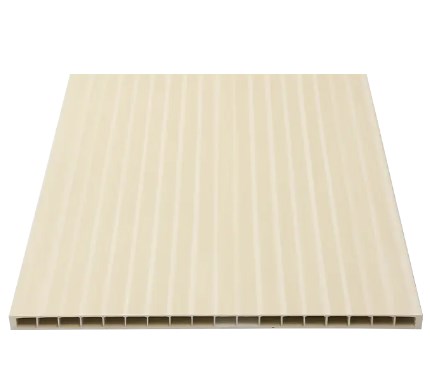In the field of modern construction and interior decoration, PVC panels (polyvinyl chloride sheets) are gradually becoming the preferred material for designers and contractors due to their unique properties and diverse applications. PVC panels not only possess excellent durability and aesthetics but also excel in environmental friendliness and ease of construction, providing the construction industry with a more efficient and economical solution.
PVC Panel Material Characteristics and Advantages
PVC panels are primarily made from polyvinyl chloride resin through extrusion or calendering processes, forming sturdy yet lightweight sheets. Their waterproof, moisture-proof, and corrosion-resistant properties make them widely used in kitchens, bathrooms, and commercial spaces. Compared to traditional wood and metal materials, PVC panels exhibit greater weather resistance, able to withstand prolonged exposure to humid environments and temperature changes without easily deforming or cracking.
PVC panels possess excellent surface smoothness and plasticity, allowing for a variety of textures and colors. Whether in a modern minimalist style or a luxurious decorative style, PVC panels can meet the aesthetic needs of different spaces through diverse design options. Meanwhile, its fire resistance and environmental performance meet the construction industry's requirements for safety and sustainable development.
Applications of PVC Panels
PVC panels are increasingly used in commercial and residential buildings. In residential spaces, PVC panels are commonly used in bathrooms, kitchens, and wall decoration, with their waterproof and mildew-resistant properties ensuring long-term stability. In commercial spaces, PVC panels are widely used for wall and ceiling decoration in hotels, office buildings, and public facilities due to their wear resistance and ease of cleaning.

PVC panels are not limited to indoor use; their corrosion resistance also makes them suitable for some outdoor environments, such as balcony cladding and exterior wall decoration. Through professional processing and surface treatment, PVC panels can resist ultraviolet rays and air pollution, maintaining their long-lasting aesthetics and functionality.
Advantages of PVC Panel Construction and Maintenance
The construction process of PVC panels is relatively simple. The panels are lightweight, easy to cut and install, significantly shortening the construction cycle and reducing labor costs. Furthermore, their connection methods are flexible, allowing for fixing via clips, glue, or screws to adapt to various spatial layout needs. For renovation projects, PVC panels can quickly upgrade the decor while maintaining the original structure.
In terms of maintenance, PVC panels demonstrate significant advantages. Their smooth surface does not easily attract dust and stains, and daily cleaning only requires wiping with a damp cloth or mild detergent. This characteristic not only reduces later maintenance costs but also improves the overall hygiene level of the space.
The Value of PVC Panels in Green Buildings
With the deepening of environmental protection concepts, the construction industry is increasingly demanding sustainability in materials. PVC panels have recycling value; their raw materials can be recycled through specialized processes, reducing the environmental impact of construction waste. At the same time, the controllable chemical stability and low volatile organic compound emissions during the production process give PVC panels a significant advantage in green building projects.
The lightweight nature of PVC panels reduces energy consumption during transportation and construction, indirectly reducing carbon emissions. This makes PVC panels not only competitive in terms of functionality and aesthetics but also in line with modern green building design principles.
PVC panels, as a high-performance, multi-functional building and decorative material, are playing an increasingly important role in modern architecture and interior design due to their waterproof, moisture-proof, wear-resistant, corrosion-resistant, aesthetically pleasing, and easy-to-maintain properties. Their ease of construction, environmental friendliness, and plasticity provide designers and construction companies with efficient and economical solutions. With technological innovation and the expansion of application scenarios, PVC panels are poised to become a significant trend in the building materials industry, driving the sector towards greater aesthetics, environmental friendliness, and intelligent design.
Recommended News